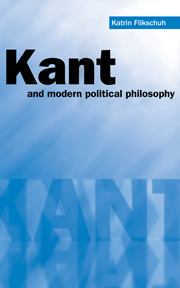Book contents
- Frontmatter
- Contents
- Acknowledgements
- List of Kant's works and abbreviations
- Introduction
- 1 Kantian metaphysics in contemporary liberalism
- 2 The metaphysics of freedom as an idea of reason
- 3 The morality of external freedom
- 4 The Lex Permissiva: property rights and political obligation in the Rechtslehre
- 5 The general united will and cosmopolitan Right
- 6 The metaphysics of Kant's cosmopolitanism
- Select bibliography
- Index
2 - The metaphysics of freedom as an idea of reason
Published online by Cambridge University Press: 22 September 2009
- Frontmatter
- Contents
- Acknowledgements
- List of Kant's works and abbreviations
- Introduction
- 1 Kantian metaphysics in contemporary liberalism
- 2 The metaphysics of freedom as an idea of reason
- 3 The morality of external freedom
- 4 The Lex Permissiva: property rights and political obligation in the Rechtslehre
- 5 The general united will and cosmopolitan Right
- 6 The metaphysics of Kant's cosmopolitanism
- Select bibliography
- Index
Summary
Is it truly a disjunctive proposition to say that every effect in the world must arise either from nature or from freedom; or must we not rather say that, in one and the same event, in different relations, both can be found?
(CPR, a536/b564)INTRODUCTION
This chapter offers an interpretation of Kant's metaphysics of freedom as initially set out in the third antinomy of the Critique of Pure Reason. Kant's characterisation of freedom as an idea of reason constitutes the most contentious aspect of his moral philosophy. His distinction between the negative and the positive conceptions of freedom is well known. While the negative conception defines freedom as a rational being's independence from determination by the causality of nature, the positive conception refers to its capacity to act from principles of pure practical reason alone. Kant often refers to the negative conception as the transcendental idea of freedom, and to the positive conception as practical or moral freedom. This chapter is primarily concerned with the negative conception, or transcendental freedom; chapter 3 deals with moral freedom, especially in relation to the Rechtslehre.
Despite the distinction between them, negative and positive freedom are not unrelated. Although we can have no knowledge of transcendental freedom, we must assume its reality for practical purposes. The possibility of practical freedom thus depends on the idea of transcendental freedom.
- Type
- Chapter
- Information
- Kant and Modern Political Philosophy , pp. 50 - 79Publisher: Cambridge University PressPrint publication year: 2000
- 1
- Cited by



